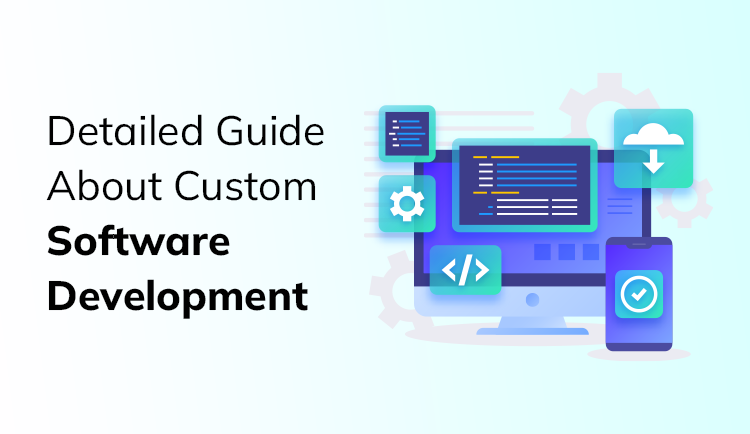
Detailed Guide About Custom Software Development
Custom software development has become increasingly common in the past few years. These developments have made it possible for even the smallest of organizations to streamline their processes, boost revenue, and retain customers.
With today’s lightning-fast technology, it’s simpler than ever to design a platform-agnostic app’s user interface. Service provider-created, custom software has altered the way businesses operate and contributed significantly to the digital transformation surge.
The primary goal of modern bespoke application development is to improve the overall business and consumer experience. Custom software development service providers are doing their best to help clients with bespoke custom software.
So, if you’re keen to learn more about custom software solutions and how these solutions can benefit your organization, then keep reading this post.
In this post, we are going to take you step by step through the process of developing bespoke software. Also, we’ll discuss the advantages of having a custom software solution for your business.
Let’s get started…
What exactly is Custom Software Development?
Software development tailored to a specific group of end users, companies, individuals, workflows, or institutions is called “custom software development.” Custom software, as opposed to commercially available software (also known as COTS), is tailored to fulfill certain requirements.
Commercial off-the-shelf software, like Microsoft Office, aims to satisfy a wide variety of needs and is therefore suitable for mass production, resale, and distribution. Their features are adequate for most website design and office productivity tasks.
However, specialized applications are tailored to meet a particular requirement, such as an online banking app, a business process automation system, and so on.
Custom software development, popularly known as bespoke software, can be carried out either in-house or by third-party development teams.
Custom software development follows the same tactics and methodologies as any other kind of software development.
A custom project begins with an analysis of needs, followed by the development of the necessary code, testing, and, finally, release.
Custom software development includes,
- Application Customization
- Application Modernization
- Application Administration
Application customization is the process of adjusting a commercial off-the-shelf (COTS) program to meet specific needs.
Modernization is to maintain the viability of a company’s unique software in order to adapt to changing user and market demands.
Application administration improves software efficiency by facilitating activities including setup, upgrades, optimization of performance and availability, and help desk procedures.
Types of Custom Software
Following are the different types of custom software:
1. Industry-Specific Software
Software developed to meet the specific needs of a particular industry, such as healthcare software, are known as industry-specific software.
Software designed for a certain industry will often include a set number of basic features that are typical for that industry. Still, the software may also include a vast number of features that are exclusive to your company.
Examples of Industry-Specific Software:
- eCommerce Software
- Healthcare Software
- Automotive Software
- Fintech Software
- And so on…
2. Destination-Specific Software
Software that assists companies in managing their resources is called destination-specific software. Custom software development plays a crucial role when it comes to developing unique programs.
It is of the utmost importance to have a robust IT ecosystem that encourages the productive utilization of all of the enterprise’s assets, including financial resources, human resources, and material resources.
Also, it is imperative to ensure that you and your consumers can easily communicate.
Example of Destination-Specific Software:
- ERP Solutions
- CRM Software
- Operational Management Software
These kinds of software are suitable for virtually every sector. They provide a comprehensive collection of analytical and managerial tools that can be customized to meet the requirements of a particular company.
3. Technology-Specific Software
Technology is evolving every day. Each day you’ll see new technology introduced in the market. The introduction of innovative technologies has shifted our perceptions of how to run and manage a business successfully.
AI and IoT have taken the world of business to a whole new level. More and more companies are now incorporating the latest technologies in custom software development.
Examples of Technology-Specific Software
- AI Software
- IoT Software
4. Platform-Specific Software
Software Tailored to a particular platform is called platform-specific software. There are wide varieties of bespoke application software, each of which takes its name from the specific platform it operates on.
However, platform-specific software can even run on other platforms as well.
Examples of Platform-Specific Software:
- Mobile Application
- Desktop Software
- Cloud Software
Each of these software needs to be developed by professionals. A professional custom software development service provider always adheres to your specifications to create a solution that is as unique and functional as you desire it to be.
Hence, it is crucial to commission a skilled team of software developers for your custom software development project.
Technologies Used To Create Bespoke Custom Software
Custom software solutions are created to meet the unique needs of a company or an individual. Whether you require a brand-new solution or want to customize an existing one, a professional developer can make it possible for you.
In any case, they are one-of-a-kind and specially tailored, keeping your unique needs in mind.
Here are the five popular custom software development technologies; take a look…
1. Blockchain
A blockchain is simply a distributed digital ledger of transactions that are stored on each node in the network of computer systems on the Blockchain. With blockchain technology, information is recorded in a way that makes tampering, hacking, or cheating extremely difficult.
Blockchain has revolutionized the whole world of business. Open-source Blockchain is at the forefront of the technology’s adoption curve.
When it comes to Blockchain, data security is of utmost importance. This technology is considered pretty useful when it comes to protecting sensitive business information, such as financial records.
Its data-safety features helped it gain traction in the banking and finance industries. Aside from being used in the financial sector, Blockchain is now used in various other industries, including healthcare, media, etc. It provides customers with robust security features.
2. Machine Learning (ML) and Artificial Intelligence (AI)
Artificial intelligence (AI) and Machine Learning (ML) have quickly grown in importance across all of today’s most popular technological infrastructures.
User experience is paramount in today’s competitive environment. That’s the reason more and more companies are now integrating these two latest technologies into their custom software development projects.
Custom software development processes are evolving as a result of the wide application of artificial intelligence (AI) and machine learning.
Developers now have access to the tools they need to make programs that are both smarter and more efficient.
Improvements in code quality and reductions in the time required for repetitive chores like debugging and testing are just two examples of how AI and machine learning are altering the software development process.
Chatbots powered by artificial intelligence is the perfect example. Chatbots are now widely used in place of human support and service agents.
3. Immersive Technology
The most cutting-edge technologies that have been on the market for some time now are those that combine elements of augmented reality (AR), mixed reality (MR), and virtual reality (VR).
These technologies were initially deployed in the military. On the other hand, these technologies are now used a lot in consumer products like virtual reality games, holograms with augmented reality, and more.
4. Open Source Technology
When software is released with its source code, it is said to be open source. This allows anyone to use the software in any way they see fit, as well as modify it and redistribute it if they so choose.
Some of the popular examples of Open-source software include LibreOffice, Mozilla Firefox, and VLC Media Player.
Its widespread use over the past decade has made it an integral part of our modern technological infrastructure. It’s essential for private and public organizations of all sizes.
Open source is the backbone of the global economy, facilitating commerce and service provision everywhere, from the Internet to public cloud computing platforms.
5. Cloud Computing
Cloud computing has gained widespread popularity in the past few years. This technology has greatly advanced custom software development. Almost every industry today relies on cloud-based application development.
As a result of the cloud’s decentralized nature, software developers have more leeway when it comes to the deployment and management of their applications.
Through the use of cloud computing, a simulated setting can be created for the administration and development of software, including the execution of automated tests.
Prior to the market meltdown, the appeal of cloud computing was limited to scaling businesses. Today, everything from hardware and operating systems to applications themselves is included.
Cloud computing has made custom software development much easier, faster, and more efficient in today’s modern environment.
Businesses employ various cloud computing models (SaaS, IaaS, and PaaS) to improve custom software development.
Advantages of Custom Software Development
If you want to build software for your business but are unsure whether custom or off-the-shelf software is the way to go, you should first determine what you hope to gain from the project and how much you’re willing to spend. It will help you decide which option is best for your company.
The following are five ways that your company can benefit from investing in a custom software solution:
1. Solutions Tailored to Your Needs
Investing in the creation of bespoke software allows you to create a solution that is tailored to your specific requirements.
There is no point in investing in off-the-shelf software and later regretting your decision.
Of course, there is no one-size-fits-all solution. Each organization is unique in its own way so are its needs.
Not only does opting for custom software development allow for expansion, but it also demonstrates that you are dedicated to the growth of your business.
2. Personalized Software
One of the most important things that contribute to a satisfied consumer is when they have the impression that they are being given particular attention.
When a business offers customers solutions that are more tailored to their specific needs, the company adds value to the relationship with its customers. This kind of extra value inspires consumer loyalty and helps businesses retain their customers.
3. Customers Satisfaction
In the era of cut-throat competition, how you serve your customers can make a huge difference. Research indicates that 71% of customers expect businesses to provide individualized solutions.
Personalized user experience can have a significant impact on your business. Therefore, custom software development is critical to your success.
4. Improved Security
Customer trust is crucial to a company’s success, and security breaches and data theft can ruin years of painstakingly built confidence in an instant.
The Internet is flooded with cyber criminals and attackers eyeing your website. It’s now your job to protect your site from these attackers.
Most commercial software uses open-source code, which is far simpler to break into commercial software. Such software is already well-known to hackers and other types of attackers for its vulnerabilities.
On the other hand, custom software is closed-source software. This implies that only your team can use it. Closed-source software, also known as patent software, significantly reduces the possibility of break-ins.
5. Easy Integration
In this day and age, where data analytics is absolutely necessary to maintain a competitive advantage, it is imperative that businesses have software that can easily integrate with other enterprise-level systems.
In terms of compatibility with other programs, ready-made software may not be the best option. Investing in custom software development can pay off in the long run because it can be built to facilitate easy integration.
When drawing up plans for a new piece of software, a developer can take into account the current setup to make sure their creation will fit in with everything else.
6. Flexibility and Scalability
Off-the-shelf solutions are not easy to scale. And businesses today need solutions that can be scaled according to the changing business environment.
In a nutshell, custom modifications are not possible with pre-packaged software solutions. And if you try to make any changes, you will most likely be in violation of the licensing agreement that you have with your off-the-shelf software providers.
In such cases, custom software solutions come in handy. These solutions are flexible and scalable. These are specifically designed keeping your business’ unique needs in mind.
7. Increased Reliability
Application reliability is critical to the success of every company. Using a bespoke solution provides a greater level of security and dependability since you own all of the solution’s rights and can determine how it is built and maintained.
Custom software developers often employ the most sophisticated industry technology and adhere to the utmost security standards. Consequently, you can always rely on this product’s superior reliability and performance.
8. Hardware
When you buy a license for off-the-shelf software, you frequently have to buy additional hardware for it to function effectively. Because of this, your total cost goes up.
Customized software development, on the other hand, takes into account the capabilities of your existing gear, allowing you to save money and avoid incurring additional fees.
Developing software conducive to your company saves you from conforming to the parameters of what is currently on the market.
The smoothest possible rollout of custom software depends on careful consideration of every aspect of your business during its development and integration.
Steps for Custom Software Development
1. Initial Conceptualization and Brainstorming
The first and foremost step in custom software development is laying all your options on the table.
After this stage and some additional filtration, you’ll be able to zero in on a specific goal and develop a workable strategy.
2. Planning
The second step in developing custom software is to come up with the overall concept and plan for it. As part of the planning process, you should evaluate the advantages and disadvantages of the overall undertaking.
3. Feasibility Study
In this stage of custom software development, the company’s top executive evaluates a proposed software project before investing in it. They do a feasibility study to determine the possibility of product success.
4. System Design
This stage entails developing a comprehensive plan for the bespoke software. This is where all the planning and design take place.
All of the software’s aesthetics, features, and architecture are discussed in this stage.
5. Coding, Architecture, Development, and Technical Design
This is the stage at which the software is put together. Developers develop the necessary architectures and write the necessary codes in this stage of custom software development.
Creating documentation that describes the software system’s functionality is also part of this process.
At this point, the developers and designers collaborate closely to make sure the final product is what the client wants.
6. Testing
After coding and development, the program is passed to the quality assurance (QA) team for exhaustive testing.
Successful tests are likely to identify a certain amount of faults. Before the product is released to people, these flaws are fixed to gauge their experiences.
Once the product comes out to be error-free after successful testing, it is forwarded to the next phase for implementation.
7. Implementation
Once testing has confirmed that there are no more bugs, the product is released to the public. Customers can try out the product and provide constructive feedback in this way.
8. Identification of Issues
Customers and the support teams of developers and designers collaborate extensively during the product’s introduction.
Both groups collaborate to learn more about user problems and desires.
Through this process, teams are able to identify problems and make necessary adjustments to serve their clients better.
9. Deployment
The final phase of custom software development is to release the finished product to users. The product is made available to the public at this stage.
However, the project team must adhere to a specific sequence of steps to guarantee that the code and associated technology are deployed correctly.
The deployment life cycle consists of four stages: planning, execution, handover of ownership, and integration.
Most of the time, the firm acquires legal title, but the original development team continues to be responsible for its upkeep.
Putting it all together…
So, here we conclude our detailed guide to custom software development. Hopefully, this article has been of great help to you. And we believe you’re now in a position to choose the best between COTS and custom software solutions.
If you have made up your mind to opt for custom software development services, then contact Annexlogics.
When it comes to creating cutting-edge mobile and online applications, nobody does it better than world-famous Annexlogics.
We offer an infinite variety of mobility solutions and highly regarded apps. We have a team of seasoned developers who can help you create bespoke custom software.
So, contact us for more information on our services!




